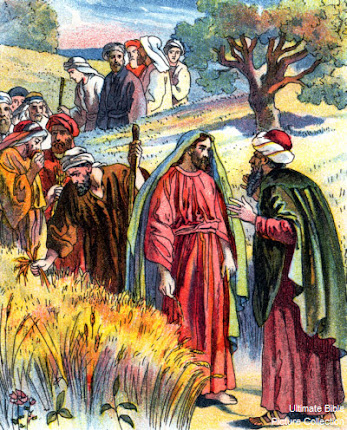Have you not read what David did
If the mission of David was sufficient grounds to justify something that would not normally be unlawful for him and his companions, how much more the mission of the Messiah, the new Davidic king anointed by the Holy Spirit? The Pharisees suggested that picking the heads of grain constituted harvesting and was therefore a violation of the Sabbath. We might have responded by arguing that they were nitpicking, they were looking for anything, however desperate with which they could condemn Jesus and his disciples. But Jesus did not engage them at the level of the technical minutia of the law. He responded to the effect that, be that as it may, there was something more important that took precedence. This was really a much more shocking claim than to simply say, for instance, that what the disciples did was not harvesting and therefore did not violate the Sabbath. So too with his second point.
I say to you, something greater than the temple is here.
The service of the temple was important enough that the priests working there were required to work on the sabbath and yet remained innocent. Jesus explained that he himself was something greater than the temple. Therefore those in his priestly service, his disciples, were free to serve him even on the sabbath and would remain innocent. This made even more sense given the fact that Jesus himself was a new and greater temple. He sometimes spoke "about the temple of his body" which would be destroyed and that in three days he would rebuild it (see John 2:19-21). In turn, his disciples would become temples of the Holy Spirit (see First Corinthians 3:16) and his disciples together as Church were also a temple (see Ephesians 2:21). This was true of disciples to the degree that they were united in Christ, the true temple. This is why in his vision of heaven John the Evangelist wrote, "I saw no temple in the city, for its temple is the Lord God the Almighty and the Lamb" (see Revelation 21:22).
If you knew what this meant, I desire mercy, not sacrifice,
you would not have condemned these innocent men.
The Pharisees had it precisely backwards. They did not desire a God who desired mercy. They preferred that he only concern himself with superficial sacrifice, for in this they could take pride, and about this they could condemn the less observant. They saw the Sabbath as something like a trap for the lax rather than something designed to be a blessing of mercy. They therefore twisted the law to make it such, to take away the primacy of rest in the presence of God, and replace it with the necessity of proper performance. The letter of the law may not have directly contradicted this interpretation. But the Spirit of the law was seen in how it was fulfilled by Jesus himself. If the Sabbath rest was meant to be anything it was joy and feasting in the presence of Jesus himself, to relationship with him. Other lesser precepts about it could only be properly understood when Jesus was at the center as the interpretative key.
For the Son of Man is Lord of the sabbath.
Who indeed is the Lord of the sabbath but God alone? Who is greater than the temple, the location of the Holy of Holies, containing the ark of the covenant were the presence of God himself was, up to that point, most available and manifest to his chosen people? None but God himself, for it is him who makes the temple holy.
Because the sabbath is directed toward our relationship with the Son of Man we now fulfill that commandment by our keeping holy the Lord's day, Sunday, in honor of his resurrection. The Saturday sabbath rest could only symbolize Jesus's sleep in the earth after his death on the cross, and was waiting for the fulfillment found in his rising from the dead. This our own observance more and not less than the sabbaths of old. The message of Jesus was not that sabbath was unimportant so we could now do whatever we desired. Instead, he implied that we should learn to order our Sundays around the one who is greater than the temple so that our lives can receive the sustenance we need for mission. Then we too could learn to have hearts like his own heart that, hearts that above all desired mercy.
Thus says the LORD: Put your house in order,
for you are about to die; you shall not recover.
Hezekiah was forced the confront his own impending death. This difficult situation made him learn to depend even more on the Lord than his previous faithful and wholehearted conduct had demonstrated. The Lord desired to draw him more deeply into relationship with him, to make him more reliant on prayer, even to the point of tears. In our own lives too the Lord sometimes permits difficulties so that we too will learn to grow in our reliance on him. After three days, hinting at the Paschal mystery of Jesus, Hezekiah went to the Lord's temple for healing. When we encounter the Paschal mystery in our lives may we follow this example, turning to the one who is himself greater than the temple, who gives us not fifteen years, but eternal life.

No comments:
Post a Comment